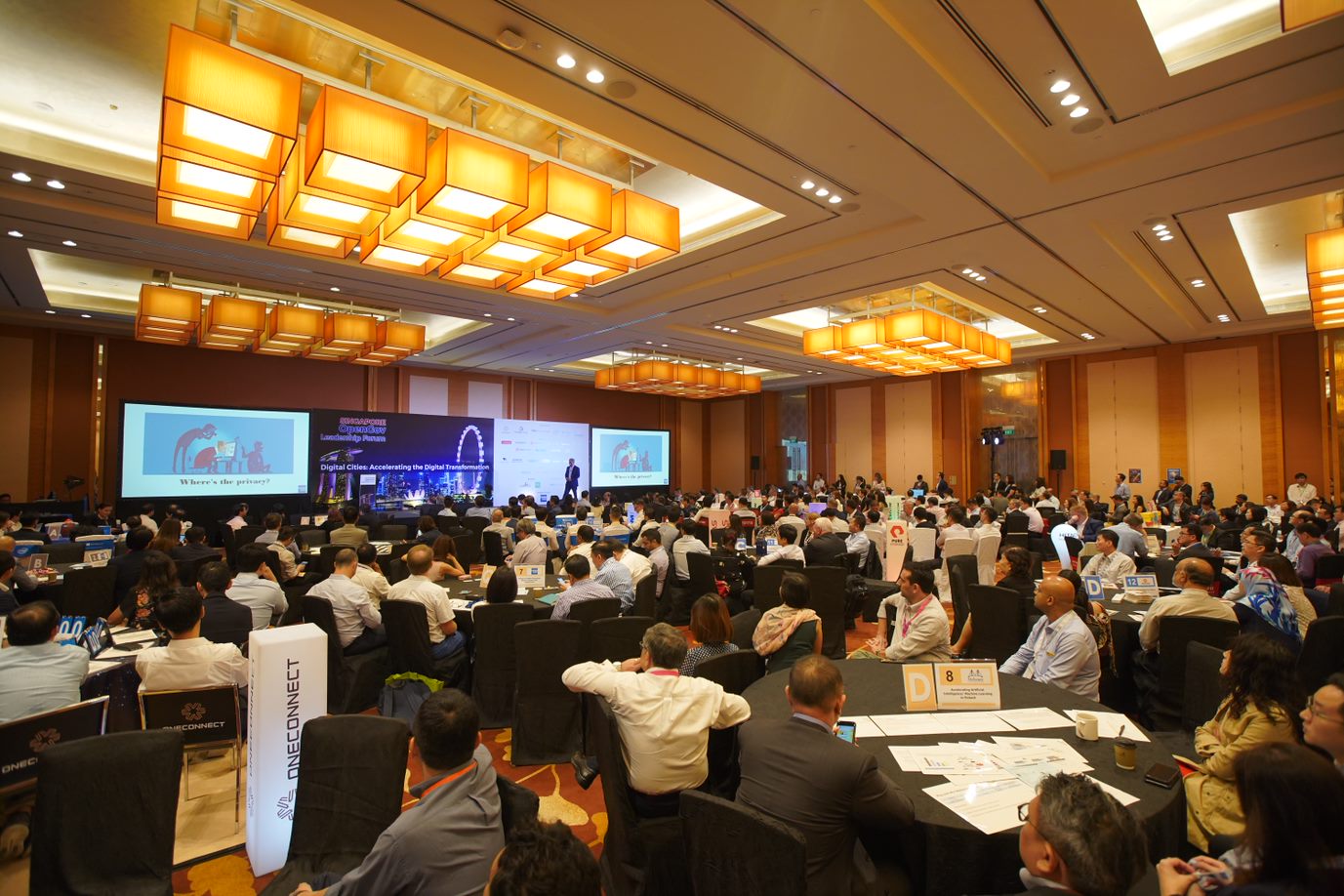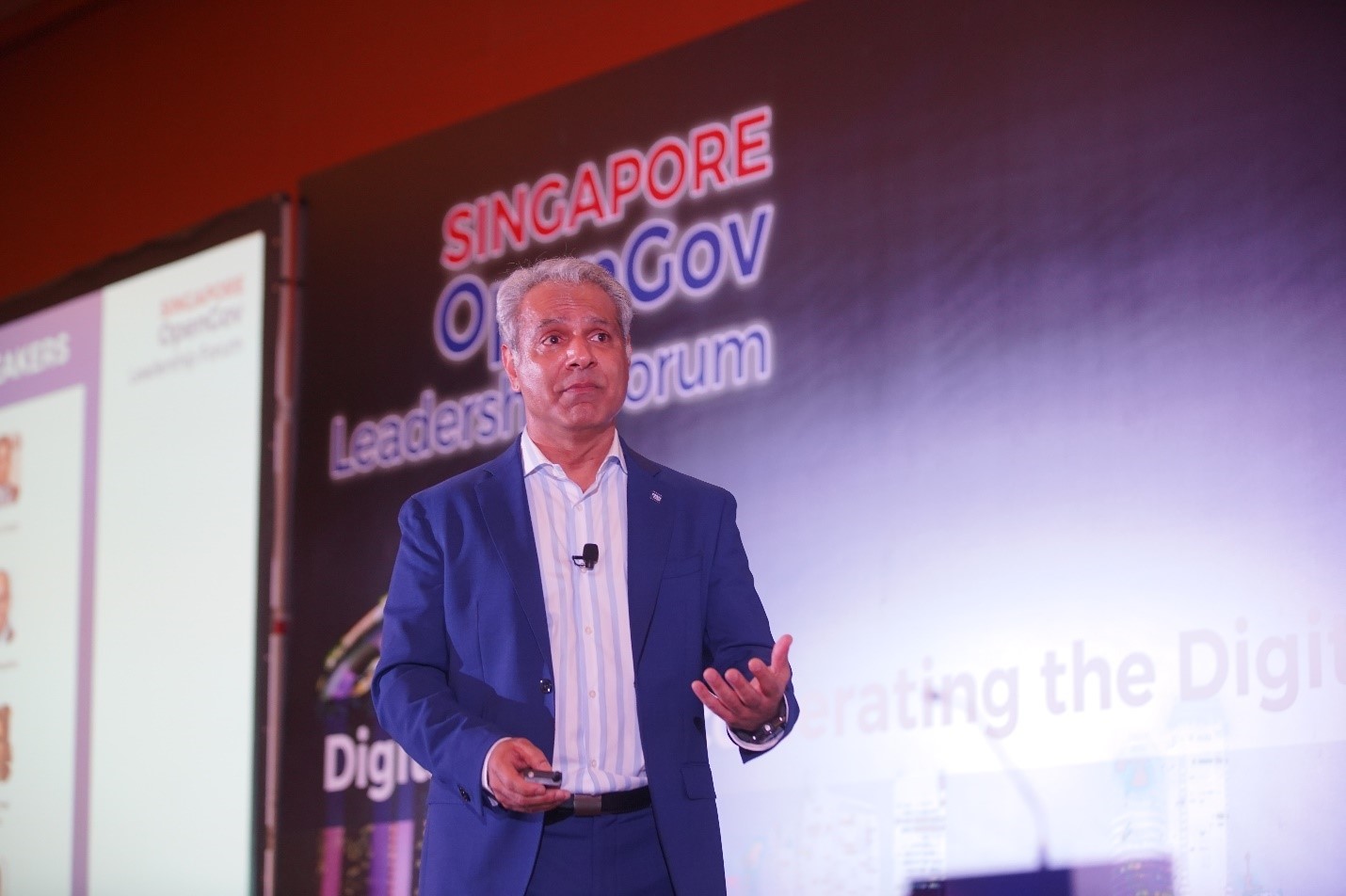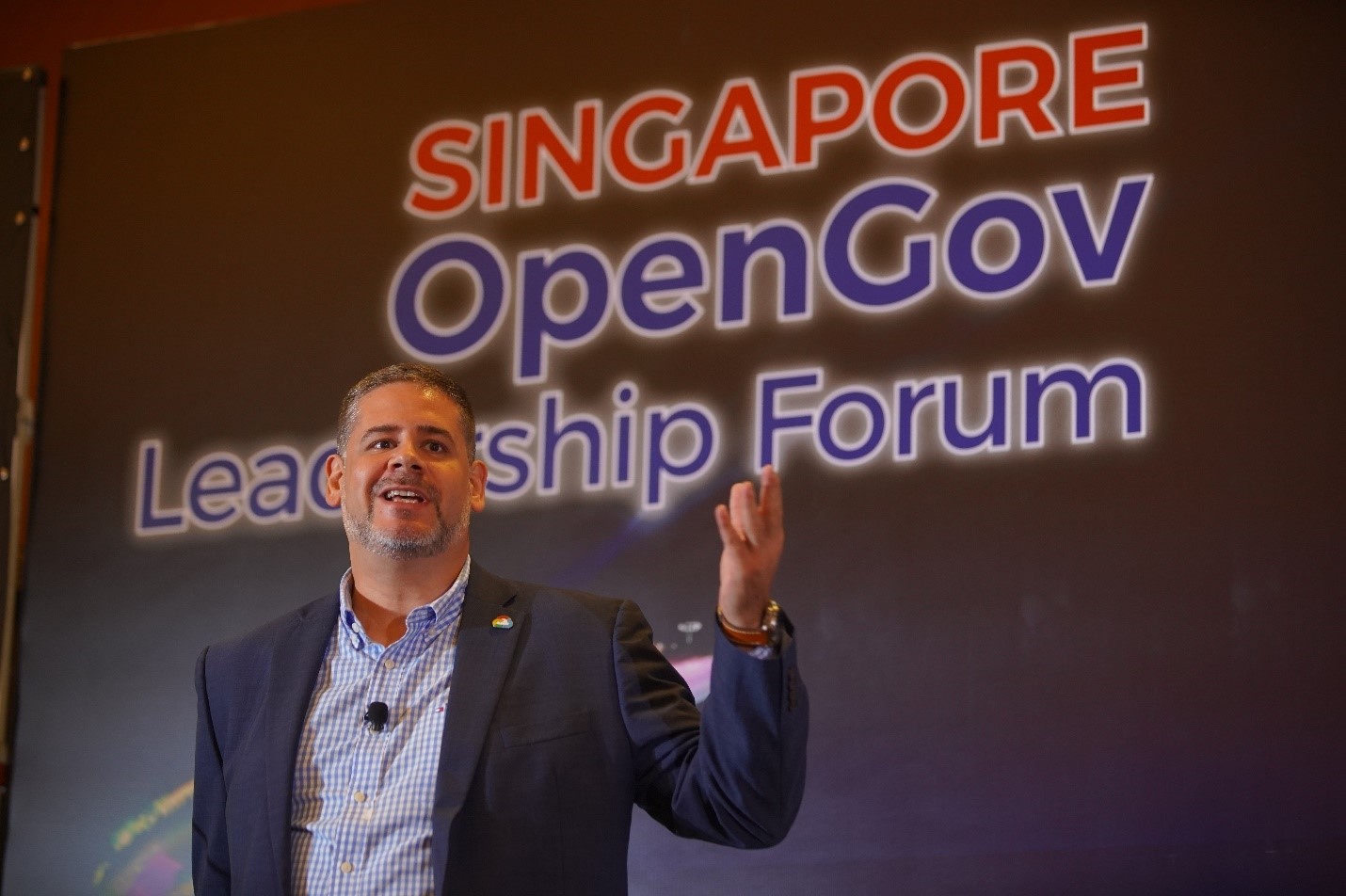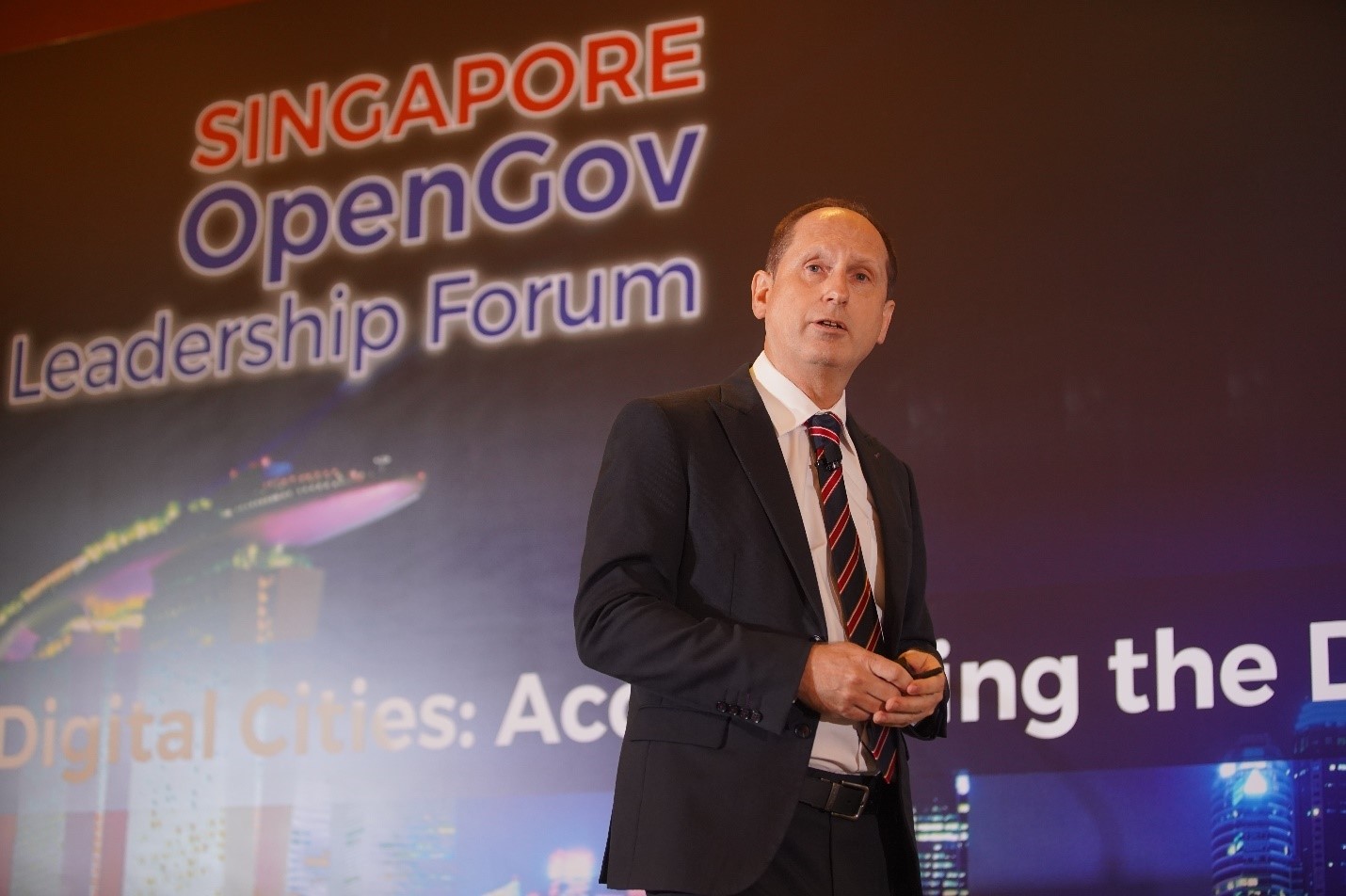
On 16th May 2019, over 500 government officials and industry leaders across the world gathered for a discussion on digital transformation in the public sector and financial services institutions (FSI). Taking place at Marina Bay Sands Singapore, this year marks the 5th Annual Singapore OpenGov Leadership Forum.
Coverage of Track 1, Track 2, Track and Track 4 can be found by clicking on the individual tracks.
The OpenGov Leadership Forum seeks to provide an opportunity for government officials, industry experts and distinguished international speakers to gather to exchange ideas and learn about the latest developments in the technology landscape.

Mohit Sagar, Managing Director and Editor-in-Chief of OpenGov Asia, kick-started the session with his opening address.
He highlighted developments happening across the world and emphasised that the world is in a greater disarray than it has been. Amidst this confusion and as connected devices become the new norm, lies the both the business value and business threat of data sharing. Questions regarding regulation, security and data privacy are critical but can also become stumbling blocks in deriving insights from data.
In conclusion, Mohit urged leaders to lead from a different perspective in this era of digital transformation. “It is incredible how we react, but we don’t act.”
After the opening address by Mohit, the delegates proceed with their first gamification session. There were four gamification sessions throughout the morning. Delegates engaged with international and local speakers to share the pain points they face in their digital transformation journey and how they can overcome those pain points.

Between the gamification sessions, the delegates had the opportunity to hear from thought-leaders on digital transformation. Speakers from across the globe as well as Singapore graced the occasion. These experts from various technical fields relevant to digital cities, spoke about developments, challenges and solutions in their journeys.

Annie Ong, Head of Business Development and Product Management at OneConnect Financial Technology, shared how ecosystem is reshaping the future of government and financial services. She discussed the achievability of an Artificial Intelligence-based automobile smart claims settlement, where AI is used to process claims. This allows fast onsite investigation and precise loss identification and assessment.
Another example she shared was the Ping An Good Doctor, which deals with long queuing periods for doctor consultation. Online consultation that addresses more simple issues make face-to-face consultation unnecessary. This reduces footfall at doctors, consequently, shortening queuing time. Technology is also being leveraged to aid diagnoses and deliver medication.
 Forming the panel discussion were Professor Chen Tsu Han, Chief Scientist at AI Singapore, Nana Liu, Assistant Professor of John Hopcroft Centre of Computer Science at Shanghai Jiao Tong University, Gertrud Ingestad, Director-General, Directorate-General Informatics at the European Commission and Ashish Singh, Vice President, Product Development at Newgen Software. Key issues being discussed were the importance of agility and a change in mindset towards empathy.
Forming the panel discussion were Professor Chen Tsu Han, Chief Scientist at AI Singapore, Nana Liu, Assistant Professor of John Hopcroft Centre of Computer Science at Shanghai Jiao Tong University, Gertrud Ingestad, Director-General, Directorate-General Informatics at the European Commission and Ashish Singh, Vice President, Product Development at Newgen Software. Key issues being discussed were the importance of agility and a change in mindset towards empathy.
A key highlight of the panel discussion was the diversity, quality and collection methodology of data for different countries. Professor Chen commented on the tremendous advantage Singapore has in the region being a multi-cultural and multi-lingual country.
Similarly, Europe sits on a lot of data. The issue they face is the interoperability of data. How do countries overcome the problem of data silos and sharing data safely, intelligently and quickly? Gertrud highlighted that the issue lies in getting systems to talk to each other and how to use data. Member states within the European Union need to agree on a minimum standard of interoperability.
“Standards can actually inhibit innovation,” a delegate pointed out during the panel discussion. While this holds true in specific circumstances, standards are key to driving innovation. Innovation can only happen when there are mechanisms in place to enable data to speak to each other and provide measures of safety.
A pertinent question brought up in the discussion was, “How do we get leaders to use more technology?”
In response, Professor Chen talked about AI Singapore’s programmes as a way to make the Singapore population become more aware and ready to use AI technology.
Interestingly, Nana brought up communication as an important factor. From her experience, there is miscommunication between the leaders and “ground-level soldiers”. There needs to be more communication between the technical people and people at a strategic level.
Ashish added that it is important to look at the outcomes of implementing technology too. One should always ask what the outcomes are and work towards it. This was reinforced by Professor Chen. He observed that people often have a misunderstanding about AI technology – that AI is wiping out jobs. The truth is though, AI technology is meant to complement people; not make them redundant.
The consensus of the panel was that the most important thing is education. Countries are well already embedded in the technology ecosystem where machines are doing vast amount of work though people have yet to realise it. As such, education becomes critical in understanding technology and increasing our awareness of how embedded technology is in our everyday lives.

Mauro Sauco, Technical Director, Office of the CTO at Google Cloud discussed what it takes to be a digitally forward-thinking leader.
Today, market forces are disrupting how businesses and organisations interact with one another. Competitors collaborate and allies become competitors. The emergence of new products and services are seen incessantly. As such, this has led to the need for businesses and organisations to rethink their value chain and innovate.
Further, customer expectations are constantly evolving in this ever-changing technology landscape of exponentially increasing data and evolving security threats. This makes it pertinent for organisations to innovate to meet the rising expectations of customers and citizens. Doing nothing is not an option for an organisation, innovation is what it takes to become a digitally forward-thinking leader.

Martin Yates, Chief Technology Officer, South Asia and Emerging Markets at Dell Technologies shared the lessons learned from implementing the smart cities of the future.
“We are moving away from traditional ICTs. You will be using the cloud, you will be using Artificial Intelligence, you will be using analytics, you will need to build data centres,” Martin said.
With changing times come evolving real world challenges. Martin illustrated a few challenges that organisations often face in digital transformation. One is the lack of data sharing. Organisations are risk-averse when it comes to sharing of data. Another challenge lies in people and culture. Often, organisations are not ready for the digital transformation.
In highlighting these challenges, Martin was driving the point home that it is time to rethink everything organisations do in IT.
Natural selection takes place in the digital world. Most government and organisations compete to become better than one another as they fear becoming irrelevant. Hence, it is important to embrace an agile practice to keep up in this ever-evolving digital world. The organisation that adapts the fastest on how it feeds on data survives. Hence, he reiterated that leadership must embrace bold technologies at speed.
While there were many incredible takeaways from the forum, the crux of accelerating digital transformation rests on 3 pillars:
- Digitally forward-thinking leadership that is active and not reactive
- Agility and innovation
- Citizen-centred growth that is underpinned by empathy
Overall, delegates left the forum with a better, deeper understanding of the key aspects of digital transformation. They understood the need for agile practices and bold embracing of new technologies in a constantly evolving, ever-changing tech landscape of exponentially increasing data and evolving security threats.
















